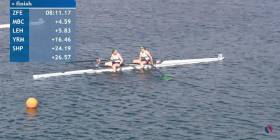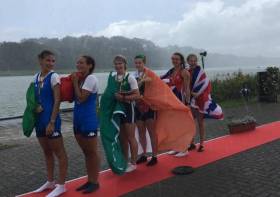Displaying items by tag: McGirr
Fermoy, Enniskillen and Bann Take Golds, Silver and Bronze at National Schools' Regatta
#Rowing: Irish crews took a full set of medals – gold, silver and bronze – in Championship finals on another excellent day at the British National Schools’ Regatta on Dorney Lake on Sunday. The Fermoy pair of Ellie O’Reilly and Gill McGirr powered away from their opponents in the second half of the Championship Pair A Final, while Enniskillen’s Nathan Timoney and Odhran Donaghy took a comfortable second in the men’s race. Aaron Christie of Bann held out well to hold on to third in the Championship Singles. Enniskillen also took a gold medal in the junior 16 girls’ pair, through Zoe McCutcheon and Maeve Donnelly.
British National Schools’ Regatta, Dorney Lake (Selected Results; Irish interest)
Saturday
Boys
Championship/Non-Championship Eight – B Final: 3 Enniskillen RBC.
Girls
Championship/Non-Championship Eight – B Final: 2 Galway 7:35.72; 3 St Michael’s 7:45.46.
Junior 16 Four, coxed – A Final: 2 Enniskillen RBC 8:22.68.
Sculling, Double – Championship A Final: 2 Workmen’s (A O’Donoghue, C Browne) 8:06.37.
Single – Championship A Final: 7 Workmen’s (C Moynihan) 9:10.40. B Final: 1 Coleraine Grammar School (M Curry) 8:43.03.
Sunday
Boys
Championship Pair: 2 Enniskillen (O Donaghy, N Timoney) 7:19.06.
Sculling, Championship Singles: 3 Bann (A Christie) 7:39.46.
Girls
Championship Pair: 1 Fermoy (E O’Reilly, G McGirr) 8:11.17.
Junior 16 Pair: 1 Enniskillen (M Donnelly, Z McCutcheon) 8:08.80
Five Gold Medals for Ireland Rowers as Fermoy Pair Win Again
#Rowing: Ireland took its fifth gold medal of the Coupe de la Jeunesse in Hazewinkel in Belgium today. Gill McGirr and Eliza O’Reilly were emphatic winners of the junior women’s pair. They led in silver-medal winners Italy by over six seconds. Britain took the bronze.
The two Fermoy women had also won gold on Saturday.
Earlier, the junior men’s quadruple had taken their second gold. Georgia O’Brien and the men’s four finished fourth and fifth respectively in their A Finals.
Coupe de la Jeunesse, Hazewinkel, Belgium – Day Two (Irish interest)
Junior Men
Four – Heat One: 2 Ireland (A Johnston, R Corrigan, B Connolly, N Timoney) 6:29.73. A Final: 5 Ireland 6:22.36.
Quadruple – Heat One: 1 Ireland (B O’Flynn, M Dundon, J Keating, J Quinlan) 6:20.92. A Final: 1 Ireland 6:10.07.
Junior Women
Pair – A Final: 1 Ireland (G McGirr, E O’Reilly) 7:37.86
Single – Heat: 1 Ireland (G O’Brien) 6:21.42. A Final: 4 Ireland 8:16.84
#Rowing: Gill McGirr and Eliza O’Reilly won gold at the Coupe de la Jeunesse in Hazewinkel in Belgium today. The Fermoy girls brought Ireland’s gold medal tally to a remarkable three. They were big winners, beating Britain’s Lucy Pullinger and Frances Curtis by eight and a half seconds. Italy took the bronze.
Earlier single sculler Georgia O’Brien and the men’s quadruple had taken gold.
Coupe de la Jeunesse, Hazewinkel, Day One (Irish interest)
Junior Men
Four – Heat One (First Three to A Final): 3 Ireland (A Johnston, R Corrigan, B Connolly, N Timoney) 6:23.78. A Final: 5 Ireland 6:27.89.
Quadruple – Heat One: 1 Ireland (B O’Flynn, M Dundon, J Keating, J Quinlan) 6:12.81. A Final: 1 Ireland 6:12.16, 2 Italy 6:14.58, 3 Britain 6:15.07.
Junior Women
Pair: Final: 1 Ireland (G McGirr, E O’Reilly) 7:48.50, 2 Britain 7:57.02, 3 Italy 8:00.26.
Single Sculls – Heat Two (First Three to A Final): 1 Ireland (G O’Brien) 8:10.17. A Final: 1 Ireland 8:09.83, 2 France 8:10.16, 3 Britain 8:14.57.
































































